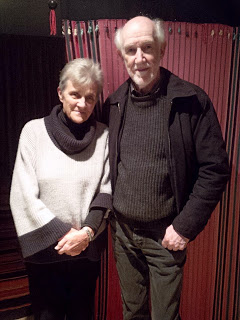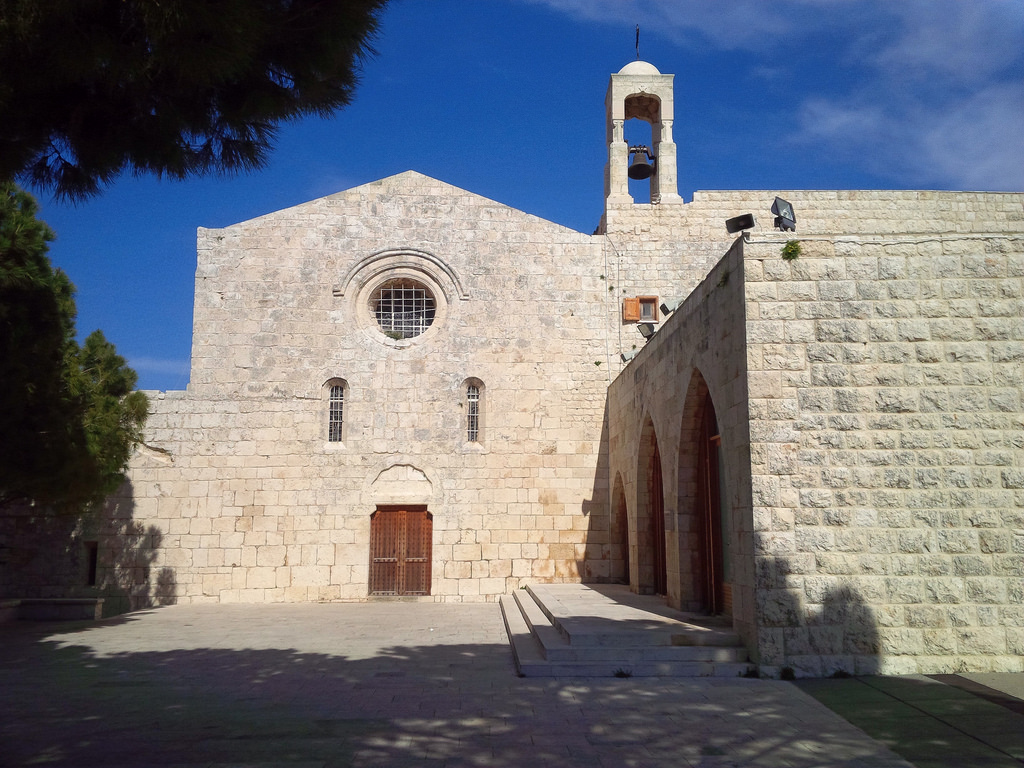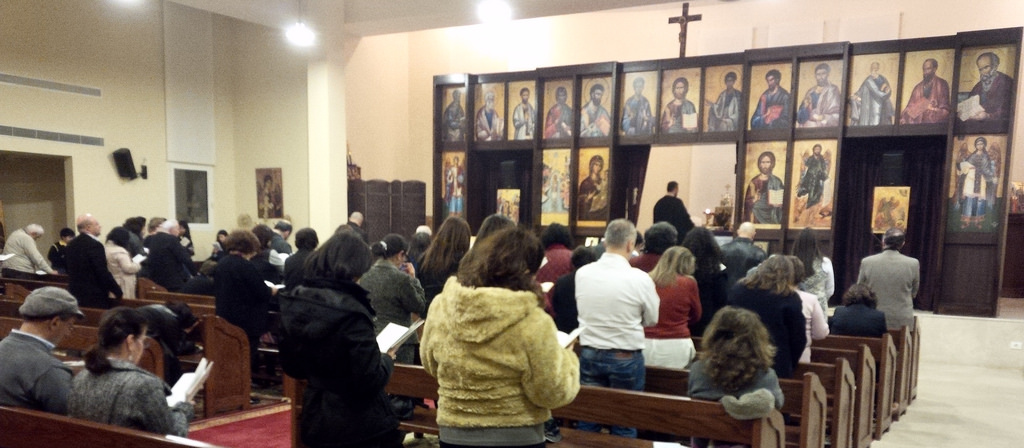Our Lady of Balamand

Triumph of Orthodoxy, Phanar

Holy Theophany Orthodox Church

Domestication
As the warm afternoon sun flooded my host’s living room yesterday, I realised that I have been indoors or in a car almost continuously since Thursday evening. I am not complaining about the hospitality – far from it – but after six months on the road, it is a radical lifestyle change. After explaining my desire to go for a short walk, I excused myself and set out.
One thing about the towns in the hills around Beirut is precisely that they are built in the hills. The roads follow the contour lines, and if you make one wrong turn, you’ll find yourself on the opposite side of a very steep valley, with no way to get to your destination other than winding down the hill and trying again. (That’s one of the reasons my Thursday evening taxi ride was so painfully long.) Another peculiarity of these areas overlooking Beirut and the sea is that they consist almost entirely of low rise apartment buildings. Any errands require the use of a car. The only people I saw walking were attached by a leash to one or more dogs. I suppose I was rather conspicuous, especially with the bright yellow duct tape patches on my shoes. (Inexplicably, my photo of the repair job that I uploaded to Flickr has received over 3000 views in a little over 24 hours.)
From the above, it’s probably quite obvious that I did not head north Sunday afternoon. I am very comfortable here, and being well fed at regular intervals. I should make an effort to do something other than sit and eat while I’m in Lebanon, or the resumption of my pilgrimage will be a real shock to the system.
When I arrive in Larnaca from Beirut on Saturday evening, I have several options. I could walk to Limassol and take the ferry to Haifa from there, or I can save a few days and fly out Sunday after attending Liturgy. The Orthodox cathedral in Larnaca was built over the tomb of Lazarus, and some of his relics have been preserved there to this day. https://en.wikipedia.org/wiki/Church_of_Saint_Lazarus,_Larnaca (This year, the commemoration of Lazarus’ resuscitation at our Lord’s command will take place on April 4, a week after I arrive at the site of his second and final grave.)
Now that I’ve processed this information, there’s no question about what I want to do. I plan to be at Liturgy Sunday morning in Larnaca. I suppose I could start walking to Limassol afterwards, but once I reach Haifa it will be about eight days of walking along the Israel National Trail before I reach Jerusalem. If I catch a Sunday flight and start walking Monday, I should arrive on Tuesday, allowing me to spend the greater part of Holy Week in Jerusalem. (Hopefully the hordes of Catholic and Protestant faithful will have withdrawn by this time.) I should have booked a hostel months ago since it is a very busy time of year, but I’m not overly concerned.
I will need to book my flight home before I reach Israel. (Apparently they may demand to see proof of departure at customs and immigration control.) My months of wandering are drawing to a close. Of course I’m eager to see friends and loved ones again, but the pilgrim way of life on the road has a beautiful simplicity to it which is difficult if not impossible to replicate when at home in the world.
In October I wrote of my mixed feelings of excitement and dread regarding my pilgrimage, and compared it to jumping off a cliff. There is no longer any dread in my heart, but my joyful anticipation at reaching my goal is mingled with some sadness. In online discussions, people who have completed the Camino often report experiencing the post-pilgrimage blues.
I don’t know what I’ll be doing when I return to Canada, other than seeking gainful employ. One thing I plan to do is maintain the habit of daily exercise I’ve acquired over the past months. (I’ve lost 20 kgs, so a new wardrobe is also in order.) A forty hour work week would provide both the time and money for a gym membership, but if I’m unable to re-enter the workforce immediately I will at least have the luxury of taking long walks each day. This might be beneficial for another reason. I’ve had several people suggest that an account of my pilgrimage could make a good book. I would need time and a good editor to work these updates into something worth publishing, and walking for several hours each day would provide me with the distraction-free time I’d need to get such an undertaking organised.
In any case, I will soon be sleeping in my own bed again, surrounded by my books and computers. There are some advantages to a domestic life that are impossible to replace while on the road.
Hmm… what’s the frequency, Kenneth?
Whatever I wind up doing over the next few days, my flight from Beirut to Larnaca is bought and paid for. I’ll be leaving Lebanon on March 28 and arriving in Cyprus after the 45 minute flight. I’m not sure whether I’ll take a plane or a ferry to Haifa, but I should be on my way to Jerusalem again shortly.
Feets, Don’t Fail Me Now
On Thursday I arrived in Tripoli much later than I’d expected. Our departure from Turkey was delayed several hours beyond the advertised time, and don’t even mention my mistaken 5:00 AM jaunt to the port. When we eventually moored in Lebanon, there was another lengthy wait was the vessel was boarded and the passengers and crew were accounted for. Once we had permission to go ashore, the interview at Customs went relatively quickly. As a Canadian, I received a one month visa, with the possibility to renew it for another month. Unexpectedly, I wasn’t charged for this — on my last trip to Lebanon I had to purchase a tourist visa at the airport. The Lebanese gov’t website I consulted before visiting this time indicated that policy is still in effect, although it didn’t mention anything about arrivals by sea.
The journey was pleasant enough. There were about a dozen passengers in total, including a few truckers who were bypassing Syria, and two cars with German-Lebanese tourists who had driven 3200 kms in five days in order to spend two weeks on vacation in the home they had left in the 1970s. One of the men had worked as an automotive engineer in Germany, and he was a bit put out at the condition of the ship. It’s not that it was obviously unsafe, but it just wasn’t up to German standards. When he mentioned possibly writing an email to the shipping company to complain about the delays and the shape of the ship, I laughed and told him he’d been away from Lebanon too long.
Since it was midafternoon when I got out of customs and found WiFi, I decided against walking to the Balamand and instead accepted the offer of a ride from my new German friends. (Two of the three adults were travelling on German passports.) That’s when I learned that one of the cars had been purchased and registered in Germany two months ago. Not normally a problem, except that Lebanese import regulations require proof of ownership for at least three months before entering the country with a vehicle. Perhaps my friends could have sprung their vehicle had they been willing to grease a few palms, but as a matter of principle, they wanted to do everything correctly and above-board. (They’ve been in Germany a looong time!) After waiting several hours, they were informed that only the head of customs for the port had the authority to release the vehicle, and he had gone home for the day. Undaunted, the Germans decided to rent a car for the night, drive down to Beirut, and return in the morning. (This is a much cheaper option than a taxi each way.)
I had been considering taking a few days to walk down to Beirut from Tripoli, but instead I squeezed into the rental car with the others and headed south along the main highway. I’d been amazed at how much Tripoli had grown in the nine years since I’d last seen the city, and the highway has seen corresponding growth. The long stretches of highway with nothing but cliff face to one side and the sea on the other have been replaced with new construction, gas stations, and shops. I was pleasantly surprised that nobody was driving against traffic on the divided highway — clearly Lebanon has become more orderly in my absence. That’s not to imply that the cheerful chaos is absent, just that driving is no longer as life-threatening as it used to be.


